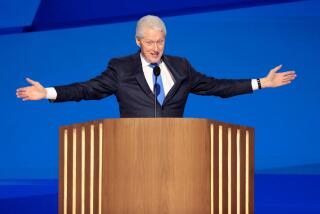4 Democrats Offer Their Looks at Life After Clinton
WASHINGTON — Vice President Al Gore and three of his possible rivals for the next Democratic presidential nomination traded competing visions of the party’s post-Clinton agenda Wednesday at the first major showcase for the Democrats’ emerging class of 2000.
Most conventional measures suggest Gore is the strong favorite to capture the nomination. But speaking here to the annual conference of the Democratic Leadership Council, a centrist political group closely allied with President Clinton, the vice president’s potential opponents and even Gore himself signaled that the race may feature a surprisingly wide-open intellectual debate about sweeping reforms in education, Social Security and the tax code.
Sens. John F. Kerry of Massachusetts and Bob Kerrey of Nebraska and House Minority Leader Richard A. Gephardt of Missouri forwarded ambitious ideas in these areas that directly challenged traditional Democratic approaches. Their aggressive stances suggest that, if nothing else, Gore will be challenged in the months ahead to lay out his own proposals for moving beyond the Clinton administration’s agenda.
“They are laying down markers for the whole party,” said Will Marshall, executive director of the Progressive Policy Institute, a think tank associated with the DLC. “What it means is that even after Bill Clinton, there will be serious champions of a new generation of Democratic reforms.”
Strikingly, Gore devoted much of his address to denouncing the idea of “compassionate conservatism.” That’s the label Texas Gov. George W. Bush, the early front-runner for the GOP nomination in 2000, has applied to his agenda. Without mentioning Bush by name, Gore argued that Republicans who support school vouchers, oppose legalized abortion and resist gun control--all positions Bush holds--don’t truly qualify as compassionate or centrist.
“There is a difference between using the rhetoric of the center and actually governing from the center,” Gore said.
As vice president, Gore not surprisingly was more cautious in offering his own agenda. Given the conference’s prime lunchtime speaking spot--and an extended standing ovation--Gore called for a new “practical idealism for the 21st century” but took only small steps toward defining the term.
Gore tried to sketch a broad framework for a post-Clinton agenda. Building on Clinton’s argument that U.S. politics has been polarized by “false choices,” Gore contended that the nation can tackle its most serious problems only if it tries to integrate seemingly divergent interests, like the conflict many parents feel in trying to balance work and home.
Gore criticized urban sprawl, called for businesses to provide more flexibility for parents and insisted that “now that we have balanced the budget, we should keep it balanced every year.”
Perhaps the day’s strongest impression was made by Kerrey. In a brisk speech, the Nebraska lawmaker stressed his support for a series of proposals likely to spark controversy among Democratic voters. Kerrey called for replacing the income tax with a “progressive consumption tax” and indicated he will offer a plan to replace Medicare and Medicaid with “a single program that guarantees [health care] coverage” to all Americans but also “requires individuals to take responsibility for controlling costs.”
Kerrey was most animated in touting his plan to revamp Social Security by cutting payroll taxes by 2 percentage points and allowing workers to use the money to set up individual accounts for retirement. Kerrey said the proposal, fiercely opposed by virtually all liberals, would convert Social Security from a program that simply provides income to one that also helps create “a generation of wealthy Americans.”
Although Gore has the strongest ties to the DLC, some in the audience compared Kerrey’s address to Clinton’s breakthrough speech before the group’s conference in 1991. “Talk about going into the den of the rival and dunking,” said political scientist Sam Popkin. “That was dunking before the game.”
The senator from Massachusetts received a more mixed reaction. Focusing on education, Kerry delivered a sometimes repetitive speech that mixed provocative proposals and rhetorical platitudes in roughly equal measure. Kerry called for converting every public school into a “charter school” free from most central oversight, ending “tenure as we know it” for teachers and easing the way for experts in other fields to teach through alternative certification.
The most intriguing appearance may have been Gephardt’s. He has sparred with the DLC on a long list of issues, including welfare reform and the North American Free Trade Agreement, both of which he opposed. But Wednesday the group received Gephardt warmly on one issue where it has praised him: his proposal for a “progressive flat tax” that would eliminate almost all deductions, tax most Americans at 10% and create five tax rates overall.
More to Read
Get the L.A. Times Politics newsletter
Deeply reported insights into legislation, politics and policy from Sacramento, Washington and beyond. In your inbox three times per week.
You may occasionally receive promotional content from the Los Angeles Times.










